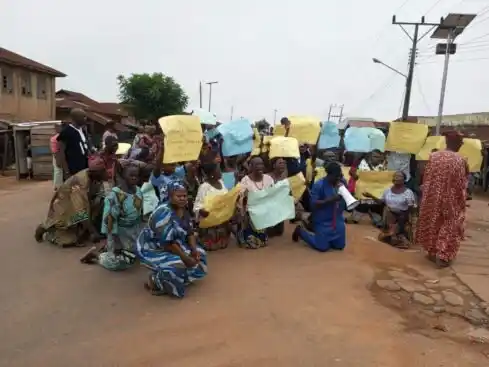Femi OGUNLANA
Wonder shall never end, unfortunately in Nigeria, they are unpalatable wonders! The latest in the litany of wonders being wrought is the National Water Resources Bill being pushed with ardency by President Muhammadu Buhari who last Thursday called on the National Assembly to quickly pass the bill.
The bill if passp noed by the National Assembly will make it mandatory for a person who desires to drill borehole in his home or anywhere to seek permission from government before doing so, a move analysts have roundly condemned.
Among others, if passed, the bill proposed that water usage be subjected to licensing provisions and that the license may be cancelled if the licensee “fails to make beneficial use of the water;” all landlords must obtain a driller permit before sinking a borehole in their homes; persons who have excess supply of water to cater for their domestic needs to reduce the quantity to what they can consume; only authorized personnel may carry out routine checks to inspect water usage or water disposal on properties with the production of their identity card or other instrument or certificate of designation if so required; and that only those permitted under the Act are permitted to consume water.
Meanwhile, analysts argued that that the bill was yet another evidence of Buhari regime’s determination to subjugate the resource-rich section of the country.
The bill was first introduced in 2018 but it was rejected by the 8th National Assembly, it suffered the same fate in 2020 when re-introduced.
But Buhari had been hammering that it was to ensure access to adequate potable water amongst all Nigerians.
A perusal of the bill according to experts shows that it was a surreptitious design by the north-controlled federal government to seize control of all water bodies in Nigeria, including the natural resources.
An expert posits, “If the contentious sails through, citizens will be compelled to get the permission of the federal government to drill bore holes in their homes or businesses premises. Obviously, this will create a lacuna and worsen access to potable water because it will burdensome to obtain permits from the government the same way it will make people vulnerable to exploitation by unscrupulous government officials. It must not be allowed to stand,” says an expert who however pleaded anonymity.

This is just as it is claimed that it is a ploy by Buhari to seize the remaining critical mineral resources under state and local authorities in Southern Nigeria.
President Buhari on Thursday renewed this demand during the inauguration of the Zobe Regional Water Supply Scheme in Katsina, during which he also urged other state governments to build strong partnerships with the federal government to provide infrastructure for Nigerians.
The president maintained that his administration would work tirelessly to ensure that Nigerians can access potable water supply and sanitation facilities.
For the president, this can only be achieved based on the “need to mobilise funds from all sources including the private sector.”
This, according to the president, is “where the need for quick passage of the National Water Resources Bill that made provision for the National WASH Fund, as well as regulatory environment for private sector involvement in the sector, becomes relevant.”
Adding, “I, therefore, call on the National Assembly to give attention to the Bill towards its passage into law as soon as possible.”
It is recalled that the bill that seeks to transfer water resources from states to the federal government was first forwarded to the National Assembly in 2017, but it attracted intense opprobrium from Nigerians especially in Southern Nigeria, leading to its jettisoning by the eighth assembly.
However, Abubakar Fulata, chairman of the House of Representatives Committee on Rules and Business, re-introduced it in 2020.
Nobel Laureate, Professor Wole Soyinka and Governor Samuel Ortom of Benue state, described the bill as “another version of RUGA.”
According to Ortom, “The bill, in addition to its provisions, which are at variance with the Land Use Act, is disguised land-grabbing legislation, designed to grant pastoralists unhindered access to river basins, adjacent marine and coastal environments across the country.
“The bill is another version of RUGA, whose objective is to create grazing areas in the 36 states of the federation for herders and their livestock.”
On his part, Soyinka was of the view that the bill was a design to hand Aso Rock absolute control over the nation’s entire water resources, both over and underground.
He had stated: “A roundly condemned project blasted out of sight by public outrage one or two years ago, is being exhumed and sneaked back into service by none other than a failed government, and woth the consent of the body of people, supposedly elected to serve as custodians of the rights, freedoms and existential exigencies of millions.
“This bill – Bill on National Water Resources 2020 – is designed to hand Aso Rock ABSOLUTE CONTROL over the nation’s entire water resources, both over and underground.”
Speaking on the evils of the proposed bill, he said, “The basic facilitator of human existence, water – forget for now all about streams of righteousness! – is to become exclusive to one centralized authority. It will be doled out, allocated through power directives from a desensitized rockery (Aso Rock) that cannot even boast of the water-divining wand of the prophet Moses. If the current presiding genius – and this applies equally to ALL his predecessors without exception – had a structured vision of Nigerian basic entitlements, Nigerians would by now, be able to boast the means of fulfilling even that minimalist item of Covid-19 protocols that call for washing one’s hands under running water! As for potable water, for drinking and cooking, let us not even begin to address such extra-terrestrial undertaking.”
Similarly, Deputy National Publicity Secretary of Ohanaeze Ndigbo, Mazi Chuks Ibegbu said: “We hardly know why our rulers deliberately court controversy and trouble. It is either CAMA or Water bill. Why can’t they for once have their peace? Why the water bill? What for and for whose interest, Nigerians or a clique?”
A development economist, Dr. Chiwuike Uba, sees the national water resources law as more of showmanship and a clear sign of misplaced priority on the part of the National Assembly. He stated that as a nation, “we need to ask the basic question of what we have done with the existing laws. What have we achieved with the multiplicity of water resources MDAs – Ministries of Water Resources, River-Basin Development Authorities, among others?”
He stressed that “Our problem is not about having enough laws and regulations, but more about having the political will to enforce the laws as well as make the right decisions.”
Uba stated that the proposed Water bill would worsen the shortages in supply and availability of water in Nigeria if passed into law, as it requires citizens to secure a license before drilling private boreholes.
While justifying his position with analytical data, Uba said: “According to the last National Bureau of Statistics (NBS) report, about 67 per cent of Nigeria’s population has no basic water supply with only about 19 per cent of Nigeria’s population having access to safe drinking water. Evidently, the number with access to a basic water supply is mainly through private sources – digging of boreholes, collection and storage of rainwater and water from streams. Despite the costs (fiscal, loss due to premature death, productive time lost, and healthcare costs) occasioned by the lack of accessible, reliable, and safe drinking water on the citizens, the governments has not made any meaningful effort to provide enough water for the citizens.
“Unfortunately, the proposed national water resources law would worsen the situation if passed into law, as it requires citizens to secure a driller’s license before drilling private boreholes. The command and control approach as being proposed in the law is not the solution.”
Uba added: “Apparently, there is an inherent confusion in the minds of the framers of the bill. Whereas they recognize that the constitution and the Land Use Act entrust the management and control of water resources within the boundaries of a state in the state government, the bill states that the federal government manages the water resource channels across two or more states. The question therefore is, do we have any land not owned by any state? The bill is at conflict with existing laws, as it seeks to remove the rights to water from the states and bring all water sources (surface and underground) as well as riverbanks under the control of the federal government through its agencies. This, no doubt, undermines the principle of federalism as enshrined in the 1999 Constitution (as amended).
“Instead of having a centralized agency that would end up worsening the water resources – access to water profile in Nigeria – what we need is vertical and horizontal coordination among the agencies of government at both the national and state levels (including the local governments and communities). The governments should also work with private sector organizations to improve clean water availability to the citizens.”Uba stated that subsidiary law of the National Assembly could not obliterate the state powers, as guaranteed by the constitution in section 133 (6).
Also speaking, former National Chairman of defunct United Progressives Party (UPP), Chief Chekwas Okorie, called on the federal government to tread with caution in the way it dishes out policies, especially those that have direct impact on the people.
Okorie said: “My candid opinion and with all sense of patriotism and responsibility is to caution the government to tread very carefully on the issue of the water bill. It is very controversial and this country at this time is restive and there are many people, who would like to see Nigeria go under and they are not leaving any stone unturned in stoking the fire of instability.
“My advice to the government is to withdraw that bill. Whatever is the intention, which probably they considered as good intention, will be difficult to be understood by most Nigerians, who would be affected by that bill and there is so much suspicion in this country today. There is hardly any move that will not be subjected to serious scrutiny with regards to religious, ethnic and sectional implications and interests.
“The section of the water bill will give federal government control not only the water and resources underground, but some kilometres from the waterfronts to be under control of the federal government. This is one sure provision that will stoke trouble in this country. Look at Niger River, for instance: if you are taking four kilometres from the bank of the river, you will cover almost the whole of Onitsha and they say that will come under the control of the federal government.
“We still have as part of our constitution the Land Use Act, which gives state governments control of land. So, how will that type of provision be married with the Land Use Act? I see a clash in those two laws. There is so much to think of in terms of healing wounds in this country and this particular water bill, whoever has persuaded the government to reintroduce it, does not mean well for the government and Nigerians.
“I am a chieftain of APC, but I won’t like to see a situation where something that will not work in the interest of the people is foisted on them. This bill is not in the interest of the people. Since it was rejected by the 8th Assembly and now being reintroduced, I would have advised against it. The ball now is in the court of the National Assembly to consider the stability of the country and do the needful, so that we can concentrate on other aspects that will bring unity to this country.”

